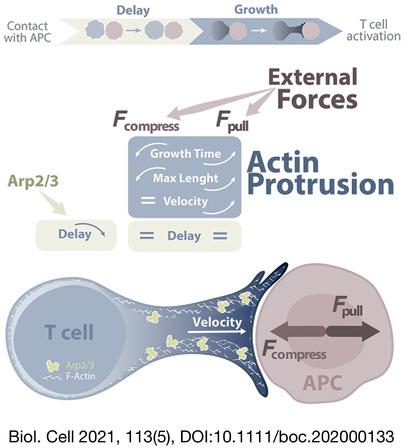当前位置:
X-MOL 学术
›
Biol. Cell
›
论文详情
Our official English website, www.x-mol.net, welcomes your
feedback! (Note: you will need to create a separate account there.)
Influence of external forces on actin‐dependent T cell protrusions during immune synapse formation
Biology of the Cell ( IF 2.4 ) Pub Date : 2021-01-20 , DOI: 10.1111/boc.202000133 Andrés Ernesto Zucchetti 1 , Noémie Paillon 1 , Olga Markova 2 , Stéphanie Dogniaux 1 , Claire Hivroz 1 , Julien Husson 2
Biology of the Cell ( IF 2.4 ) Pub Date : 2021-01-20 , DOI: 10.1111/boc.202000133 Andrés Ernesto Zucchetti 1 , Noémie Paillon 1 , Olga Markova 2 , Stéphanie Dogniaux 1 , Claire Hivroz 1 , Julien Husson 2
Affiliation

|
BACKGROUND INFORMATION
We have previously observed that in response to antigenic activation T cells produce actin-rich protrusions that generate forces involved in T cell activation. These forces are influenced by the mechanical properties of antigen presenting cells (APCs). However, how external forces, which can be produced by APCs, influence the dynamic of the actin-protrusion remains unknown. In this study, we quantitatively characterized the effects of external forces in the dynamic of the protrusion grown by activated T cells. RESULTS
Using a micropipette force probe, we applied controlled compressive or pulling forces on primary T lymphocytes activated by an antibody-covered microbead, and measured the effects of these forces on the protrusion generated by T lymphocytes. We found that the application of compressive forces slightly decreased the length, the time at which the protrusion stops growing and retracts and the velocity of the protrusion formation, whereas pulling forces strongly increased these parameters. In both cases, the applied forces did not alter the time required for the T cells to start growing the protrusion (delay). Exploring the molecular events controlling the dynamic of the protrusion, we showed that inhibition of the Arp2/3 complex impaired the dynamic of the protrusion by reducing both its maximum length and its growth speed and increasing the delay to start growing. Finally, T cells developed similar protrusions in more physiological conditions, i.e. when activated by an antigen presenting cell (APC) instead of an activating microbead. CONCLUSIONS
Our results suggest that the formation of the force-generating protrusion by T cells is set by an intracellular constant time and that its dynamic is sensitive to external forces. They also show that actin assembly mediated by actin-related protein Arp2/3 complex is involved in the formation and dynamic of the protrusion. SIGNIFICANCE
Actin-rich protrusions developed by T cells are sensory organelles that serve as actuators of immune surveillance. Our study shows that forces experienced by this organelle modify their dynamic suggesting that they might modify immune responses. Moreover, the quantitative aspects of our analysis should help to get insight into the molecular mechanisms involved in the formation of the protrusion. This article is protected by copyright. All rights reserved.
中文翻译:

免疫突触形成过程中外力对肌动蛋白依赖性T细胞突起的影响
背景信息我们之前已经观察到,响应于抗原激活,T 细胞产生富含肌动蛋白的突起,产生参与 T 细胞激活的力。这些力受抗原呈递细胞 (APC) 的机械特性的影响。然而,APC 产生的外力如何影响肌动蛋白突出的动态仍然未知。在这项研究中,我们定量表征了外力对活化 T 细胞生长的突起动态的影响。结果 使用微量移液管力探针,我们对由抗体覆盖的微珠激活的原代 T 淋巴细胞施加受控的压缩力或拉力,并测量这些力对 T 淋巴细胞产生的突起的影响。我们发现压缩力的应用略微减少了长度、突起停止生长和收缩的时间以及突起形成的速度,而拉力则大大增加了这些参数。在这两种情况下,施加的力都不会改变 T 细胞开始生长突起所需的时间(延迟)。探索控制突起动态的分子事件,我们发现抑制 Arp2/3 复合物会降低突起的最大长度和生长速度,并增加开始生长的延迟,从而削弱了突起的动态。最后,T 细胞在更多生理条件下形成类似的突起,即当被抗原呈递细胞 (APC) 而不是激活微珠激活时。结论 我们的结果表明,T 细胞产生力的突起的形成是由细胞内恒定时间设定的,并且其动态对外力敏感。他们还表明,由肌动蛋白相关蛋白 Arp2/3 复合物介导的肌动蛋白组装参与了突起的形成和动态。意义 T 细胞产生的富含肌动蛋白的突起是作为免疫监视执行器的感觉细胞器。我们的研究表明,这种细胞器所经历的力会改变它们的动态,这表明它们可能会改变免疫反应。此外,我们分析的定量方面应该有助于深入了解突起形成所涉及的分子机制。本文受版权保护。版权所有。
更新日期:2021-01-20
中文翻译:

免疫突触形成过程中外力对肌动蛋白依赖性T细胞突起的影响
背景信息我们之前已经观察到,响应于抗原激活,T 细胞产生富含肌动蛋白的突起,产生参与 T 细胞激活的力。这些力受抗原呈递细胞 (APC) 的机械特性的影响。然而,APC 产生的外力如何影响肌动蛋白突出的动态仍然未知。在这项研究中,我们定量表征了外力对活化 T 细胞生长的突起动态的影响。结果 使用微量移液管力探针,我们对由抗体覆盖的微珠激活的原代 T 淋巴细胞施加受控的压缩力或拉力,并测量这些力对 T 淋巴细胞产生的突起的影响。我们发现压缩力的应用略微减少了长度、突起停止生长和收缩的时间以及突起形成的速度,而拉力则大大增加了这些参数。在这两种情况下,施加的力都不会改变 T 细胞开始生长突起所需的时间(延迟)。探索控制突起动态的分子事件,我们发现抑制 Arp2/3 复合物会降低突起的最大长度和生长速度,并增加开始生长的延迟,从而削弱了突起的动态。最后,T 细胞在更多生理条件下形成类似的突起,即当被抗原呈递细胞 (APC) 而不是激活微珠激活时。结论 我们的结果表明,T 细胞产生力的突起的形成是由细胞内恒定时间设定的,并且其动态对外力敏感。他们还表明,由肌动蛋白相关蛋白 Arp2/3 复合物介导的肌动蛋白组装参与了突起的形成和动态。意义 T 细胞产生的富含肌动蛋白的突起是作为免疫监视执行器的感觉细胞器。我们的研究表明,这种细胞器所经历的力会改变它们的动态,这表明它们可能会改变免疫反应。此外,我们分析的定量方面应该有助于深入了解突起形成所涉及的分子机制。本文受版权保护。版权所有。











































 京公网安备 11010802027423号
京公网安备 11010802027423号